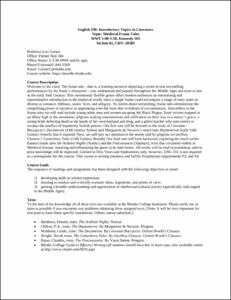Please use this identifier to cite or link to this item:
http://hdl.handle.net/10267/15477| Title: | ENGL 190-02, Medieval Frame Tales, Spring 2010 |
| Authors: | Garner, Lori |
| Keywords: | English, Department of;Syllabus;Text;Curriculum;2010 Spring |
| Issue Date: | 13-Jan-2010 |
| Publisher: | Memphis, Tenn. : Rhodes College |
| Series/Report no.: | Syllabi CRN;20589 |
| Abstract: | Welcome to the class! The frame tale—that is, a framing narrative depicting a series of oral storytelling performances by the frame’s characters—was widespread and popular throughout the Middle Ages and even as late as the early 16th Century. This enormously flexible genre offers modern audiences an entertaining and representative introduction to the medieval world, since a single frame could encompass a range of story types as diverse as romance, fabliaux, saints’ lives, and allegory. As stories about storytelling, frame tales demonstrate the compelling power of narrative in negotiating even the most dire or tedious of circumstances. Storytellers in the frame tales we will read include young noble men and women escaping the Black Plague, flood victims trapped in an abbey high in the mountains, pilgrims seeking entertainment and edification on their way to a martyr’s grave, a young bride deferring death at the hands of her own husband and king, and a gifted teacher who uses stories to awaken the intellect of hopelessly foolish princes. Our first unit will be devoted to the study of Giovanni Boccaccio’s Decameron (14th-century Italian) and Marguerite de Navarre’s much later Heptameron (early 16th-Century French) that it inspired. Next, we will turn our attention to the stories told by pilgrims in Geoffrey Chaucer’s Canterbury Tales (14th-Century British). Our final unit will look backward, exploring the much earlier Eastern frame tales the Arabian Nights (Arabic) and the Panćantantra (Sanskrit), texts that circulated widely in Medieval Europe, inspiring and influencing the genre in its later forms. All works will be read in translation, and no prior knowledge will be expected. Limited to First Years and Sophomores only; however, ENG-151 is not required as a prerequisite for this course. This course is writing intensive and fulfills Foundations requirements F2i and F4. |
| Description: | This syllabus was submitted to the Office of Academic Affairs by the course instructor. Uploaded by Archives RSA Josephine Hill. |
| URI: | http://hdl.handle.net/10267/15477 |
| Appears in Collections: | Course Syllabi |
Files in This Item:
| File | Description | Size | Format | |
|---|---|---|---|---|
| 2010_SPRING_ENGL_190_02_20589.pdf | 146.35 kB | Adobe PDF |  View/Open |
Items in DSpace are protected by copyright, with all rights reserved, unless otherwise indicated.